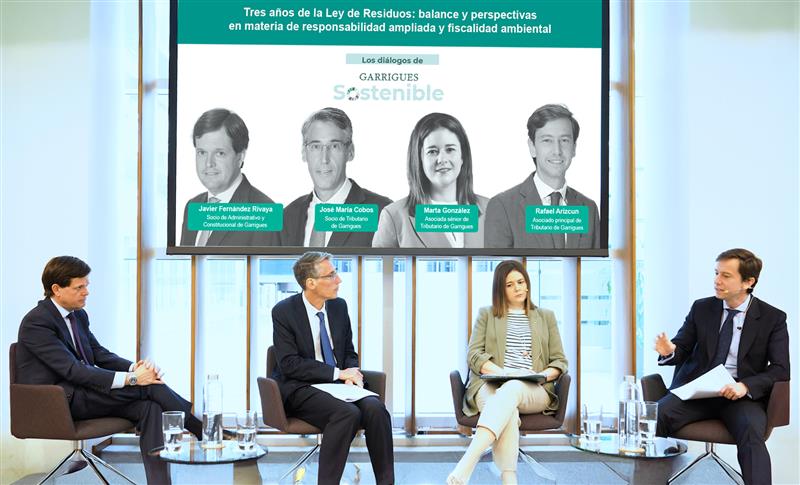Extended producer responsibility and environmental taxation under examination after three years of the Waste Law
Garrigues experts analyze the legal and tax challenges posed by the regulations, from the new packaging tax to the future deposit and return system (DRS)

As part of the Garrigues Sustainable cycle, a further session was held on April 8 with the title "Three years of the Waste Law: achievements and future prospects of extended responsibility and environmental taxation." The meeting brought together experts from the firm to reflect on the impact of this regulation since its entry into force, with a special focus on extended producer responsibility (EPR) and the new tax frameworks related to waste management.
The session was inaugurated by José María Cobos, partner in the Tax area, who stressed that the third anniversary of the Law on Waste and Contaminated Soils for a Circular Economy offers an ideal opportunity to assess its effects and anticipate the challenges that lie ahead.
Next, Javier Fernández Rivaya, partner in the Administrative and Constitutional Law practice area, emphasized the regulatory shift towards greater involvement of producers: "It is no longer just about those who manufacture, but also about those who import or market products. The law goes a step further, even involving e-commerce platforms." He also referred to the regulatory development of the standard in the field of packaging and which, in principle, will soon be developed for the textile process flow. He went on to explain the next steps derived from the deposit and return system (DRS), for which the deadline for requesting authorization expires this May and which is expected to come into operation in November 2026.
In relation to taxation, Rafael Arizcun highlighted the change in focus of the new waste disposal tax: "Before, it was based on the principle of equivalence; now it is based on environmental criteria such as 'the polluter pays' and the principles of circular economy". For her part, Marta González addressed the challenges posed by the Tax on plastic packaging, especially due to the complexity of applying criteria deriving from environmental regulations in the tax field: "It is not even always clear which products are packaging or when they are reusable".
The session also addressed the fiscal and operational implications of the future regulatory framework on food waste. Javier Fernández highlighted its ambitious objectives in terms of reducing food waste, while Rafael Arizcun focused on the changes that the future law introduces in relation to Local Tax Authorities. Marta González expressed the view that the regulation should have envisaged tax incentives in the tax on packaging for products intended for the donation of food: "The opportunity to equate these with products that already enjoy similar benefits has been lost."
It was clear that, three years after its entry into force, the Waste Law has opened up a new front in environmental management, with important legal and fiscal implications that will continue to evolve in the coming years.
Related content:
- The EU Packaging and Packaging Waste Regulation has been definitively approved
- Spain: Publication of royal decree governing the management of waste of tobacco products with filters and of filters
- The new waste tax and its numerous questions
- Spain: new tax measures in the Law on waste and contaminated land for a circular economy
Contacts



-
+34 983 36 14 75

